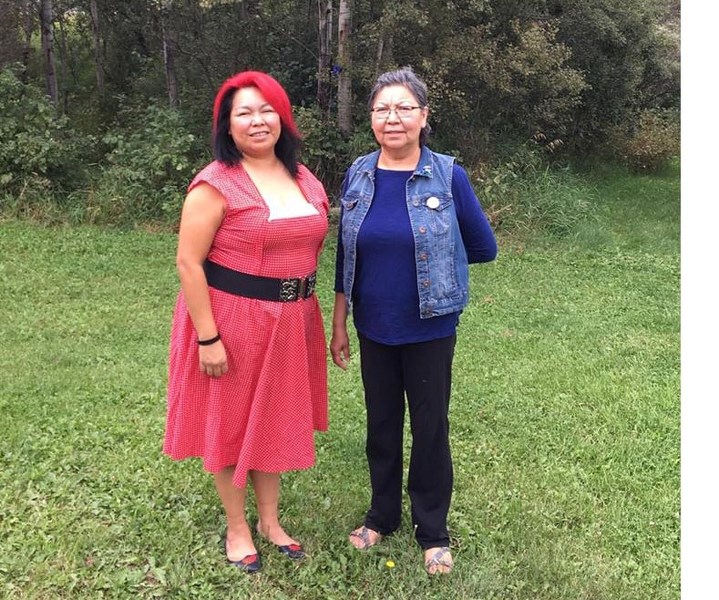Pamela Quinn says she has heard the word “squaw” used to describe First Nations women before – at hockey arenas or at school when she was growing up. But when she heard it most recently last week in St. Paul, it was the catalyst for the Kihew Asiniy teacher to respond back, saying it wasn’t right – with her video posted on Facebook of the interaction having more than 30,000 views.
She was surprised to see such a huge response, with some saying the video brought back experiences for them and others expressing pride in her for sticking up for herself, when they may have bitten their tongues in the past.
“Sometimes you want to speak up and it’s tough, and they would have liked to have spoken as well. I’m glad I spoke up, because it was for them too,” she said, adding she hoped the video would create awareness about narrow-minded attitudes and behaviours out there. “I hope it’s also a way to have discussions in your home about racism . . . that it’s not OK.”
Quinn and her mother Florence were on St. Paul’s main street on Aug. 27 when a black truck carrying a group of young men slowing down as they passed her, with one person shouting “Double squaws!” at them. Both heard the comment, and with her mother agreeing with her, Quinn decided to follow the group of boys.
Quinn followed the truck until it came to a stop at a business on the north side of St. Paul. She rolled her window down and confronted them, saying hello and then explaining, “You called us a couple of squaws when we were walking by.”
“Yeah, no. I think you misheard us,” one answers back.
In the video, Quinn and her mother both stand firm, saying, “No, we heard what you said,” and with Quinn telling them she was videotaping the interaction. She identified herself as a teacher at Kihew Asiniy, and told the young men, “But that’s wrong. You shouldn’t be saying that.”
At some point, a “Sorry” can be overheard from the other vehicle.
Over the course of the week, the video was shared 300 times, with more than 30,000 views, with several expressing apologies and their appreciation to Quinn for standing up for herself.
“It bothers me that this word, among others, is flung around so easily and casually. Thank you for standing up to that, and not allowing it to be brushed off! We must teach other that racism will not ever be tolerated,” came one of the comments.
Quinn noted that she had a “sincere apology” from one of the young men’s mothers, who was upset by what happened and that her son and his friends’ actions became so public, with the woman telling Quinn she hadn’t raised her son to be that way.
Parents try to do the right thing when they’re raising their children, said Quinn, but she noted, “We don’t really know what’s going to happen when they get together like that, what they’re going to say. We just have to trust that our children role-model what we role-model in our homes.”
While only one of the young men might have called out the name, she noted none of his friends spoke up or came back to apologize, and instead, from what she could overhear as they passed her, laughed at the name-calling.
“I think that’s how it is with society. We sometimes ignore people and what their actions are. We let them say what they say and do what they do, and we look the other way, or laugh. When you laugh, what does that say? That says that’s OK.”
“You can step up and take the lead, and say that’s wrong.”
Quinn’s father Carl, of Saddle Lake, agreed that more people needed to stick up for each other when they see racism or discrimination.
“Essentially, we need to talk about it, and things need to change.”
He said he thought his daughter handled the situation well, staying in control when confronting the men in the vehicle, but noted others who are marginalized or not as willing to speak out may let similar remarks pass.
“If you’re silent, you’re acquiescing to the status quo,” he said, urging all people, no matter their background, to stand up to incidents of racism. “I think more needs to be done, not just by politicians, but all people.”
His daughter adds she hopes the video doesn’t end with many shares and views and no action, but rather as a starting point for momentum on conversations about racism, about racial profiling or people walking in the street.
“There’s a whole lot of community building we need to do in our nations – Saddle Lake, Goodfish Lake, Kehewin, St. Paul, Bonnyville, Vegreville, all these places that there’s a lot of tension,” she said, adding on the need to create better relationships. “We have to feel like we all belong. I think it’s important that we feel respected, that we respect each other . . . that we have that mutual respect and kindness towards each other.”



